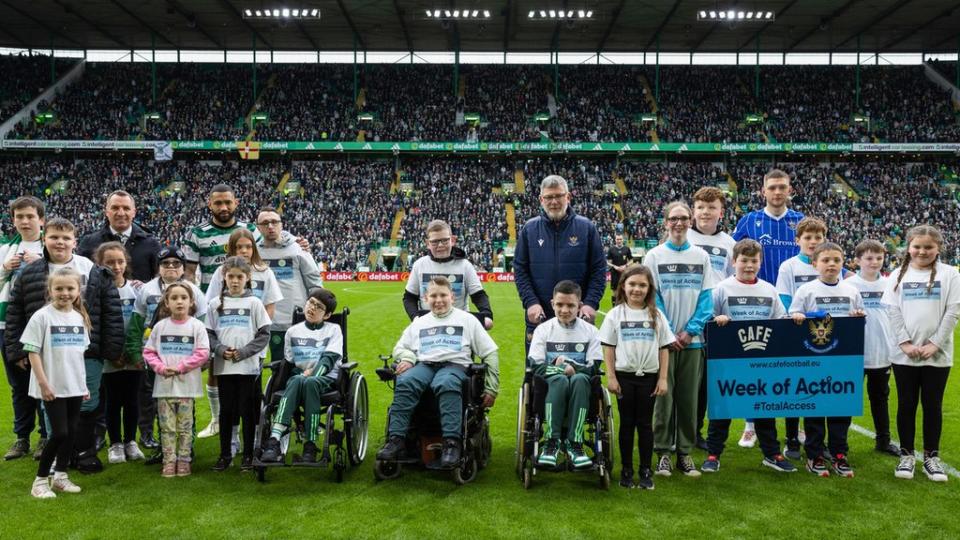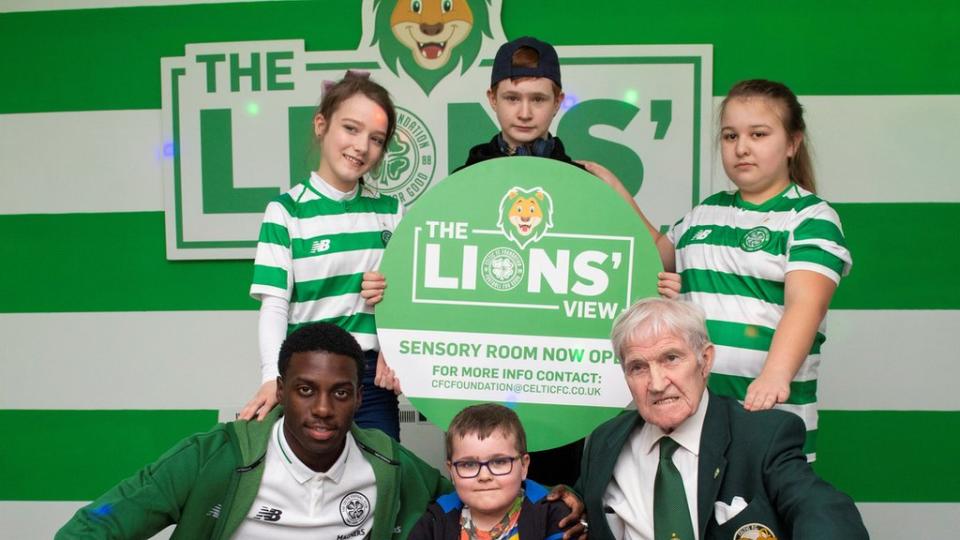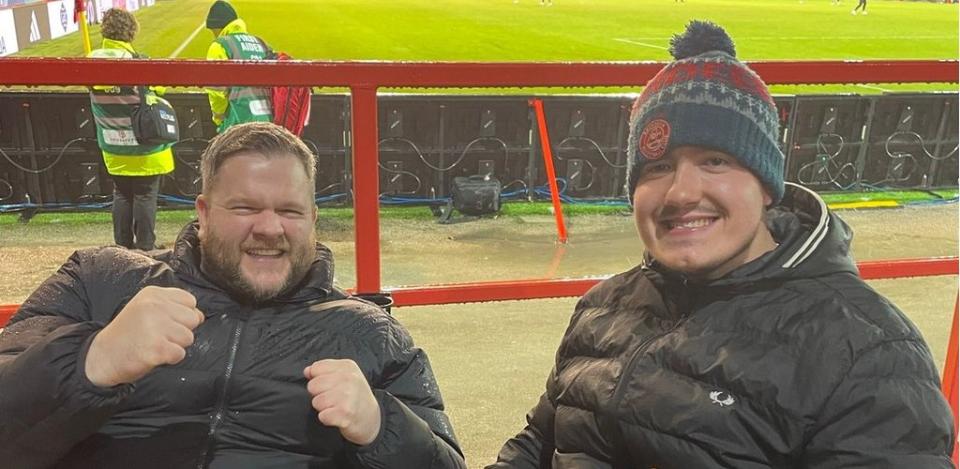Disabled fans: Does Scottish football do enough for all supporters?

"We're getting there, but we'll never get there."
Sandy Riach - former chairman of the now defunct Scottish Disabled Supporters Association - has seen a lot of change in the 20-plus years he's been advocating for better accessibility in Scottish football.
For the most part, the direction of travel has been positive, with services and standards vastly improved from the days when he was organising a group of disabled Aberdeen fans on a bus to Pittodrie in the early 2000s.
But is Scottish football doing enough?
BBC Sport Scotland examines what the game is giving to a dedicated section of its support, what the modern matchday experience looks like, and what needs to happen next to ensure football is truly for all.
What do clubs offer?
As times have changed, clubs across Scotland have had to reconsider their arrangements for ensuring disabled supporters are safe and comfortable in their stadiums.
This has involved increased wheelchair access, forums for open discussion and the appointment of disability access officers.
After reaching out to the 12 top flight clubs, most reported a constant monitoring of their facilities and a desire to improve them whenever possible.
As is often the case, however, financial concerns are the first hurdle.
"Clubs have to pay for it out their own pocket," Riach says. "And in a lot of cases, that's hard to do because of the number of people that actually go to the games, funding and sponsorships.
"A lot of it is to do with the age and condition of the stadiums, because practically all of them were built before 1995, when the first Disability Act came in."
Dundee admit this problem makes enhancements at the 125-year-old Dens Park challenging and hope to build a new stadium soon.

Similarly, Ross County recognise not all of their facilities are "fully accessible" and say they are committed to making "necessary reasonable adjustments".
Rangers have plans to build a platform in the Copland Stand later this year, adding 33 new wheelchair-accessible spaces to Ibrox. And Hibs have added new platform lifts in two areas of Easter Road.
Across the capital, Hearts are increasing their disabled car parking spaces after strong demand, while St Mirren are in "ongoing discussions" about adding a sensory room for neurodivergent fans.
Football is just as much about feeling as it is seeing, with services for the visually impaired on the rise.
Celtic have a dedicated section behind the home dugout, while most clubs offer audio descriptive commentary.
The Parkhead side - along with Hibs and Aberdeen - also employ British Sign Language interpreters on matchdays for deaf fans.
Motherwell have commissioned their fan-ownership group the Well Society to conduct a survey of their disabled supporters to bolster the club's understanding of their requirements.
Taking on the views of those using the facilities is key, according to St Johnstone's disability access officer Beverley Mayer, who has pioneered various projects in Perth.
"If somebody brings something to our attention, then we ask 'how can we achieve this?'," she says. "You learn from your supporters, the biggest educators we've got are the service users."
What is the fan experience like?
Would you still pay for your season ticket if you had players, pillars and police blocking your view of the pitch?
It's something many disabled supporters have had to accept as part of the matchday experience for years.
Laurie Finlayson attended Rugby Park for over a decade before Kilmarnock installed a new viewing platform last season.
To most, a League Cup group stage game against Partick Thistle would be fairly insignificant. For Finlayson, who has cerebral palsy, it was life-changing.
"As a disabled fan, you don't expect a good view or a good experience," he says. "It almost felt like it was my first game as a fan. Finally, I was part of it all without being segregated.
"I think it's a bit of a disgrace among Scottish football that clubs haven't been given the support to improve their facilities earlier."
Actually seeing the game is one thing most punters tend to take for granted, but so is being able to be wrapped up in the passion.
Wheelchair user Darren Abel thinks his desire to be immersed in the atmosphere can often be overlooked as a disabled fan.
"What people want out of their matchday experience differs," he says. "I like the ultras scene. Being involved in the atmosphere is a huge part of going to the football for me.
"Some people care more about having an amazing view or access to the pie stand. That's less important to me."
These different preferences emphasise that there's no one-size-fits-all approach to accessibility.
However, the advent of sensory rooms can calm the sometimes daunting aura of football stadia.
Kevin McLaughlin reflected on his experience of taking son Aaron to his first Celtic game last year, using their Lion's View sensory room: "For me, it represented a day that I never thought would be possible," he says.
"I had just accepted that I would never be able to take Aaron to Celtic Park. On that day, Aaron's life got that bit bigger."
What's next?
Although things have improved, the fight for true equality is far from over.
The Centre for Access to Football in Europe says its mission is to bring "total access" to the sport, heightening empowerment and understanding while eradicating barriers.
For that to happen, the supporters who currently face those barriers in grounds around Scotland say self-interest needs to be left at the door.

"If all the clubs collaborated, we'd be able to make real progress," Finlayson says. "I'm sure if something works at one club, it may well work at another, so sharing ideas would be key, but that doesn't always happen in Scottish football."
Abel adds: "There needs to be open dialogue with people who actually go to the games. That's rather than people sitting around a table and making decisions they think are right when they're not living that experience day in, day out."
But with this goal to create a nuanced, diverse and inclusive matchday experience that welcomes supporters into our game regardless of disability, the same economic issues continue to rear their head.
Undeniably, improvements have and will be made, but without investment and innovation, Scottish football may continue to fall short of serving devoted fans who support its clubs, in spite of the challenges their disabilities may present.
"We've still got a long way to go," Riach says. "Will it happen in my lifetime? I don't think so. It's just too much money.
"Until we have new stadiums, there will always be these issues. It's about mindset, change happens from the top. We need to improve what we've got."
Additional reporting by Michael McEwan

